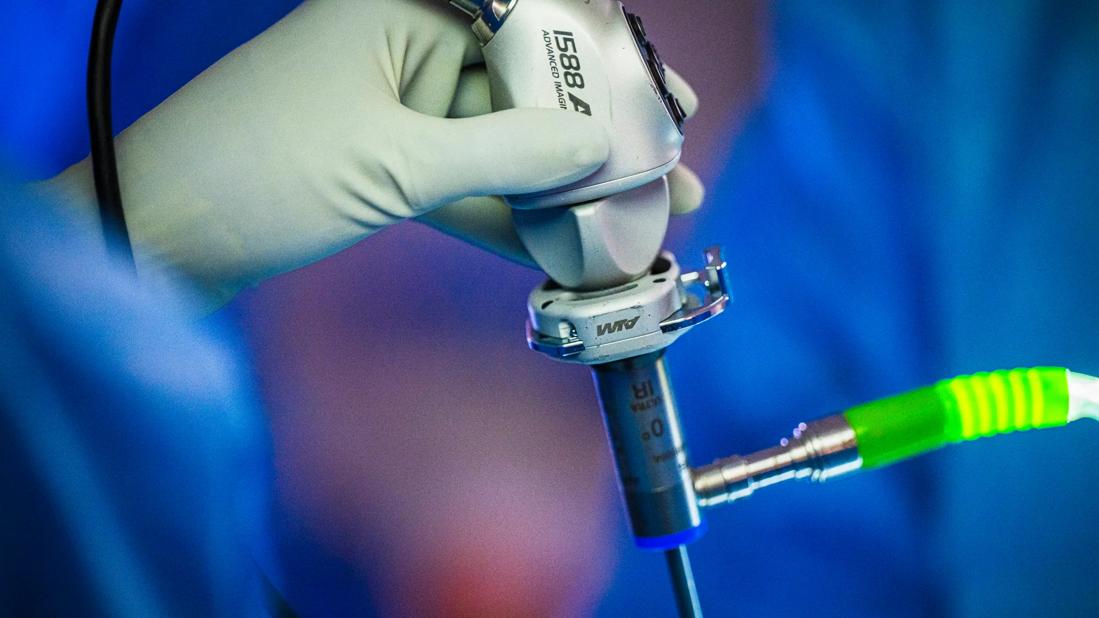First report of major endpoint reduction in patients with biopsy-proven NASH

The list of health benefits of bariatric surgery continues to grow, with the latest being reductions in the risk of major adverse liver outcomes (MALO) and major adverse cardiovascular events (MACE) in patients with obesity and nonalcoholic steatohepatitis (NASH), or fatty liver disease.
Advertisement
Cleveland Clinic is a non-profit academic medical center. Advertising on our site helps support our mission. We do not endorse non-Cleveland Clinic products or services. Policy
This new finding is from the Cleveland Clinic-led Surgical Procedures and Long-term Effectiveness in NASH Disease and Obesity Risk (SPLENDOR) study, published in JAMA (2021;326:2031-2042). The retrospective investigation showed that bariatric surgery reduced the risk of NASH progression to cirrhosis, liver cancer or liver-related death by 88% and the risk of MACE by 70% relative to nonsurgical management.
“These are some of the largest reductions in disease risk I have seen in three decades of conducting studies,” says the study’s senior investigator, Steven Nissen, MD, Chief Academic Officer of Cleveland Clinic’s Miller Family Heart, Vascular & Thoracic Institute.
The increasing prevalence of NASH, which has mirrored that of obesity, underscores the import of these findings, as NASH is now one of the most common causes of liver failure and liver transplantation worldwide.
“There is no FDA-approved medication for fatty liver disease,” says the study’s lead investigator, Ali Aminian, MD, Director of Cleveland Clinic’s Bariatric & Metabolic Institute. “The striking findings of this study provide strong evidence that bariatric surgery should be considered as an effective therapeutic option for patients with advanced fatty liver disease and obesity.”
The SPLENDOR investigators analyzed data from patients who underwent liver biopsy at Cleveland Clinic between 2004 and 2016. They identified 1,158 adult patients with obesity (median body mass index of 44.1 kg/m2) and a histologic diagnosis of NASH with liver fibrosis (histological stages 1 to 3) but no cirrhosis, alcohol-related liver disease or other identifiable causes of liver disease.
Advertisement
Of this cohort, 650 patients (67% women) underwent bariatric surgery, the Roux-en-Y gastric bypass procedure in 537 (83%) and the simpler sleeve gastrectomy procedure in 113 (17%). The remaining 508 patients (60% women) served as the nonsurgical control group. To balance histological and clinical differences between the groups at baseline, the researchers used a propensity score method called overlap weighting.
Over median follow-up of 7 years, MALO (a composite of liver cirrhosis, cancer, transplantation or liver-related death) occurred in five patients in the bariatric surgery group versus 40 in the control group. In adjusted analysis, this translated to an adjusted absolute risk difference at 10 years of 12.4% and an adjusted hazard ratio of 0.12 (P = 0.01).
MACE (coronary artery events, cerebrovascular events, heart failure or cardiovascular death) occurred in 39 patients in the surgery group versus 60 in the control group. The calculated 10-year adjusted absolute difference was 13.9%, with an adjusted hazard ratio of 0.30 (P = 0.007).
“SPLENDOR is the first study we know of to demonstrate that an intervention is associated with a reduction in major clinical endpoints in patients with biopsy-proven NASH,” notes Dr. Aminian. “Comprehensive hepatology and bariatric surgery programs at Cleveland Clinic, with liberal performance of liver biopsy for nearly 10,000 patients with fatty liver in the medical and surgical settings over the past two decades, enabled us to conduct this study.”
Advertisement
Patients undergoing bariatric surgery also lost much more weight: 22.4% from baseline at 10 years, compared with 4.6% in the control group (P < 0.001). Among patients with diabetes at baseline, bariatric surgery was likewise associated with a significant reduction hemoglobin A1c levels relative to nonsurgical management (P < 0.001). These findings confirm the durability of health benefits of bariatric surgery, as demonstrated in the Cleveland Clinic-led STAMPEDE clinical trial.
Obesity, type 2 diabetes, NASH and cardiovascular disease are all highly correlated with each other, the common factor appearing to be an underlying metabolic derangement. Indeed, bariatric surgery is often called metabolic surgery in view of its beneficial metabolic effects.
“Obesity is the main driver of NASH,” says Dr. Nissen. “The SPLENDOR study shows that in patients with obesity and NASH, substantial and sustained weight loss achieved with bariatric surgery can simultaneously protect the heart and decrease the risk of progression to end-stage liver disease.”
That said, he adds, retrospective studies such as SPLENDOR can go only so far. “The time has come for a prospective, multicenter clinical trial of metabolic surgery with MACE endpoints,” Dr. Nissen concludes.
Advertisement
Advertisement

Benefits of neoadjuvant immunotherapy reflect emerging standard of care

Multidisciplinary framework ensures safe weight loss, prevents sarcopenia and enhances adherence

Study reveals key differences between antibiotics, but treatment decisions should still consider patient factors

Key points highlight the critical role of surveillance, as well as opportunities for further advancement in genetic counseling

Potentially cost-effective addition to standard GERD management in post-transplant patients

Findings could help clinicians make more informed decisions about medication recommendations

Insights from Dr. de Buck on his background, colorectal surgery and the future of IBD care

Retrospective analysis looks at data from more than 5000 patients across 40 years